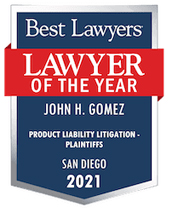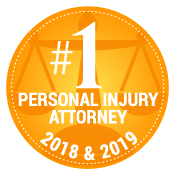San Diego Train Accident Lawyer
- 550+ Google 5-Star Reviews
- $1 Billion won over 15 years
- Won’t settle for low offers, not afraid to fight for max value
Get a Free Case Evaluation
No fees until we win!
All San Diego Case Types

Personal Injury

Brain Injury

Car Accident

Slip & Fall

Truck Accident

Wrongful Death
San Diego Train Accident Attorney
Gomez Trial Attorneys: Helping San Diego Train Accident Victims Seek Compensation
At Gomez Trial Attorneys, we have extensive experience dealing with a wide range of personal injury claims. We have handled many injuries, from slip and fall accidents like the ones you might endure moving about a poorly maintained train, brain injuries, cervical fractures, burns, and other injuries that you might suffer in a train accident.
Our team excelled at some of the top law schools across the nation and continue to distinguish themselves as they moved into practice. We have worked with judges, worked as prosecutors, and took positions in some of the biggest and best corporate law firms in the country.
When we take a personal injury case, we fight hard to help our clients obtain the compensation they deserve. We will help increase your understanding of the compensation you deserve, and fight to help you obtain that compensation through your train accident claim.
The High Risk of Train Accidents in San Diego
In one recent year, the Federal Railroad Administration named San Diego one of the 10 most dangerous counties in the nation for fatal train versus pedestrian accidents. Sometimes, these accidents occurred because pedestrians chose to jog or walk in off-limits areas, even when the areas had clear markings that indicated the possible dangers and warnings.
Other times, however, train track deaths occur for different reasons.
Poor Fencing
Often, users traveling across private property might not recognize the presence of train tracks or what it might mean if they traveled too close to them until it becomes too late. Sometimes, to prevent pedestrian or driver deaths, train tracks need an increased number of signs and better fences to help keep out people who do not belong there.
Dangerous Crossings
In many areas, train tracks do not offer safe crossing areas, although they cross over public areas or areas where people often spend time. In Del Mar, for example, the areas around the bluffs do not have clearly marked crossing areas, and the public can easily access most of the train tracks.
Unfortunately, trains often reach beyond the area of the tracks viewers expect. Modern trains have also become increasingly fast and quiet, which makes it hard for people to realize that they’re coming.
Many areas throughout the greater San Diego area also have little provisions for safe train crossings. For example, while Del Mar residents maintain the right to cross over the train tracks to reach the beach, the railroad does not provide tunnels, bridges, or other safe crossing options that would prevent residents from having to walk on the tracks.
As a result, if visitors misjudge the trains’ speeds, they may suffer severe accidents in the blink of an eye, without a chance to avoid them.
Higher-Volume Traffic
Train traffic has increased throughout San Diego in recent years as more people and goods alike need transportation throughout the area. While more trains offer a higher level of convenience for train passengers, it also means more opportunities for accidents on the tracks.
Those accidents can also lead to increasing levels of disruption that may cause further mistakes or future accidents.
Fast Trains
Modern trains can travel 90 miles per hour throughout the San Diego area. While these higher speeds help passengers and goods reach their destinations faster, they may also make it more difficult for people on the tracks, whether in a vehicle or simply taking a shortcut across the tracks to reach the beach or a local area of the community, to get out of the way as the train comes flying through. Faster trains have raised the risk of accidents in recent years.
Inadequate Security Personnel and Training
Security agents help police trains and protect the tracks, decreasing the risk of accidents. Unfortunately, those agents may not offer as much protection as users might hope.
In fact, in many cases, those security officers receive little training and work long hours for relatively little pay and benefit. Officers also do not receive adequate training to help them address potential threats, which means they may respond too slowly or fail to respond adequately to the hazards they may encounter.
Poor Line Maintenance
While San Diego trains typically receive regular line maintenance, they may degrade over time—and they do not always receive adequate maintenance to remove those risks. Poor line maintenance can substantially increase the risk of train derailments and dangerous collisions.
San Diego Train Accident Laws: What You Need to Know
Railroads bear a high degree of liability when it comes to keeping their trains and the rail lines as safe as possible. Train accidents can lead to severe damages, not just for the people immediately involved in the accident, but for everyone around them. Any injuries caused by the railroad’s negligence become the liability of the railroad.
In addition, railroads fall under the Federal Employers Liability Act. The FELA establishes that employees of interstate railroad companies may not receive coverage under workers’ compensation like other employees throughout San Diego and the greater California area. Instead, injured railroad workers will need to file a lawsuit against the railroad to show that the railroad’s negligence caused the worker’s injury.
Railroads generally bear liability for injuries to railroad workers that result from failure to provide adequate safety training, failure to provide needed safety equipment, failure to adhere to federal regulations regarding worker hours, or pushing those employees to adhere to unrealistic or unsafe time requirements or other demands.
San Diego rail lines are highly regulated. They must receive regular maintenance, both on the lines and the trains, to ensure that they offer a safe experience for both train riders and those on the tracks.
County transportation agencies, regional commissions, and JPAs all work together to provide these vital elements of the California public transportation system the funding to build a safe infrastructure, make improvements, and keep up with the traffic moving through the area.
Train Accident Injuries in San Diego
Train accident injuries can occur in many ways.
Slip and Falls on the Train
As you get onto the train or move inside the cars, you may suffer a slip and fall. Slip and fall accidents can result from spilled liquids, uneven floors, or poor maintenance on the flooring around your train. These accidents may result in severe injury.
Injured individuals may suffer from:
- Traumatic brain injury
- Broken bones in the hands or arms
- Spinal cord injuries
- A broken hip or hips
Sometimes, slip and fall accidents can cause severe, ongoing complications in a victim’s life, including permanent disability.
Train/Car Collisions
When a train collides with a car, it can cause severe injuries to the passengers of the car. The train may travel through railroad crossings at a substantial rate of speed, which means it will hit the car with a great deal of force.
Train/car collisions can result in:
- Traumatic brain injury
- Back and neck injuries, including spinal cord injury
- Amputations
- Broken bones
Train/car collisions often result in death for the passengers of the car.
Train Derailment Accidents
In a train derailment, the train comes off of the tracks entirely, often tipping over. The injuries that result from train derailment accidents may vary, depending on the train’s cargo. While California carefully regulates the substances carried on trains that move through the state’s roads, that does not necessarily eliminate the possibility for trains carrying hazardous substances to cause serious problems if the train derails.
Trail derailments that result in chemical spills can cause:
- Increased cancer risk
- Respiratory ailments
- Digestive ailments
- Chemical burns
The Aftermath of Train Accident Injuries
Following train accident injuries, victims may suffer from a variety of problems. Many injuries can cause long-term difficulties. For example, victims with traumatic brain injury may have a hard time focusing or concentrating on the task at hand. Victims with spinal cord injuries may struggle to perform physical tasks. Many people with spinal cord injuries, especially complete spinal cord injuries, end up in a wheelchair for the rest of their lives.
Train accident injuries can also prevent many people from working, either short or long-term. A cancer diagnosis, for example, may put the victim of a train derailment accident in the hospital for a long time, making it difficult for him to complete his usual job duties. Victims with traumatic brain injuries following a train/car collision may need to spend a great deal of time recovering before they can maintain the focus necessary to perform their usual job duties.
Who Bears Liability for San Diego Train Accident Injuries?
Following a San Diego train accident, your attorney will help you find the liable party or parties. By evaluating all parties that caused or contributed to the accident, you can seek compensation from each one.
Slip and Fall Accidents
After a slip and fall accident on a train, your attorney will evaluate what led to your accident. Did you slip in a pool of liquid that did not have any nearby signs or warnings? Did you suffer injuries because of uneven carpeting or poorly repaired flooring? If so, you may have grounds for a claim against the railroad. The railroad bears a high duty of care to all passengers who use it and needs to exercise a high degree of care in preventing accident risks.
Train/Car Accidents
At an intersection between a road and a railroad, the train always has the right of way. Drivers should stop any time they see flashing lights at a railroad crossing and allow the train to pass safely. Drivers should never attempt to beat the train or get across the tracks before the train arrives.
However, railroad operators and companies also bear a strong duty of care to drivers who need to cross rail lines. In some cases, the driver may not know that the train is approaching. Broken railroad crossing indicators, including lights and bars, could cause a car to proceed across the rail line despite the approach of a train.
Within city limits, trains also need to slow down substantially and indicate their presence when traveling near roads and railroad crossings.
If the railroad or train operator fails in these duties, the railroad may share liability for an accident with a car.
Train Derailment Accidents
The California Public Utilities Commission (CPUC) mandates maintenance for rail lines, including railroad crossings, throughout California. The CPUC also insists upon proper maintenance for all railroad tracks. In some cases, particularly if the CPUC ignores potential hazards or does not insist that the railroad take care of them, the agency may bear liability for injuries suffered from a train derailment in that area. On the other hand, if the railroad does not take care of maintenance as required, the railroad may bear liability for the train derailment.
In addition, if the train carries hazardous cargo, the manufacturer of that cargo or the party that hired the train for transportation may bear liability for any injuries or illnesses sustained due to the derailment of that train and cargo spilling into the air, water, or surrounding area.
Recovering Compensation Following a San Diego Train Accident
No matter how you suffer injuries in a San Diego train accident, whether through a slip and fall on the train itself or a serious diagnosis following a train derailment, talk to your attorney as soon as possible to learn more about your right to recover compensation for your injuries and ailments.
Most claims that stem from a train accident will include compensation for:
Medical Expenses
Your medical expenses will mount quickly after a train accident. If you suffered a slip and fall accident or sustained injuries in an accident between a train and a car, you may need to go straight to the emergency room for immediate treatment. You may have several surgical procedures in your future, which may begin shortly after the accident. You may also need to go through substantial physical or occupational therapy following severe injuries, especially those that involve permanent disability.
If you face a cancer diagnosis after a train derailment accident and exposure to toxic chemicals, you may have even more substantial and ongoing medical bills. You may have to pay for scans and tests to diagnose your cancer, chemotherapy and/or radiation, and surgical procedures used to help you regain your overall health. Sometimes, cancer may require long-term hospitalization or you may need in-home care to help you while you recover from your ailments.
Ideally, you should keep track of all medical bills related to your injuries or diagnosis together in one location. In many cases, you may receive multiple medical bills for the same procedure. For example, if you have surgery, you may receive bills from the anesthesiologist, the hospital, and the doctor who performed your surgery. All of these bills go to different people and may have separate copays and deductible amounts associated with them. You should also track what your insurance covers from those bills so that you will know the full cost of your medical treatments.
If you face a cancer diagnosis after a train derailment, make sure you keep track of all bills for procedures, including ongoing chemotherapy expenses, the cost of durable medical equipment to help aid in mobility or keep you comfortable at home, and the cost of each appointment with your doctor. By keeping track of all of your bills, you can make it much easier to present the full extent of your medical expenses.
Tracking your bills can also give you a much better idea of how much compensation you should pursue after a train accident, which may prevent you from mistakenly accepting a settlement offer that does not reflect your real needs.
Lost Income
Missed time at work can quickly add up during an already expensive period of your life. Treatment for severe injuries or cancer can leave you hospitalized long-term, making it impossible for you to show up at work. You may have to remain home while immunocompromised, or you may lack the ability to complete your usual job tasks, even as you progress through your recovery.
The longer your recovery takes and the more severe your injuries, the greater your financial losses due to missed work opportunities will likely grow.
Even once you can return to work after your initial diagnosis or injury, you may not fully have the ability to go back to your usual job tasks and schedule. You may, for example, need to miss even more work due to follow-up appointments and procedures. You may have to attend physical or occupational therapy appointments even once you can go back to your usual job tasks.
Not only that, you may not have the ability to return to work on your usual schedule immediately. Even if your employer can work with you by temporarily or permanently decreasing your job responsibilities, you may lack the capacity to work full-time immediately after your return.
All of those hours can add up to substantial financial losses.
Some people can use vacation time or PTO for time missed at work due to severe injuries. Temporary disability insurance can also help provide much needed assistance during those difficult times. However, you may then lack the ability to use your PTO for other things, including vacations. Talk to an attorney about how to claim compensation for all of the time you missed at work, including the time you may have covered using PTO or disability.
Pain and Suffering
You have many tangible financial losses related to your train accident injuries—losses you can calculate and clearly display. You may also have immense losses that have nothing to do with your finances. A cancer diagnosis due to toxic chemical exposure after a train derailment, for example, may leave you with lost enjoyment of life or missed opportunities, including activities you would normally have enjoyed, vacations you would have taken, or time with loved ones. Spinal cord injuries or traumatic brain injury can permanently change the course of your life, as they may leave you unable to participate in the activities that you previously enjoyed.
Many people with severe injuries also find that those injuries interfere with their relationships. They cannot participate in the activities they once could have, so they may notice relationships falling away or people failing to engage with them. These lost relationships may cause further emotional trauma during an already difficult period.
Finally, many victims struggle with immense physical pain related to their train accident injuries. Sometimes, that pain can prove chronic, making it a lifelong complication that victims must contend with as they try to rebuild their lives.
An attorney can help you determine how to include compensation for pain and suffering as part of your San Diego train accident claim.
How Can An Experienced San Diego Train Accident Lawyer Help?
- A lawyer can ensure that you fully understand the compensation you deserve. Many times, insurance companies will pray on victims’ lack of knowledge regarding the compensation they really deserve for their injuries. These companies may try to convince you that you do not really deserve compensation for all of your medical expenses or that you do not deserve compensation for pain and suffering. An attorney can review the insurance policy, look over your medical bills and other losses related to the accident, and provide you with a full assessment of the value of your claim.
- An attorney can help investigate your claim. What led to your train accident injuries? Often, train accident injuries occur due to negligence. For example, if you suffered injuries in a slip and fall while traveling as a passenger on a train, it may result from poorly maintained carpeting or stairs. If you suffer injuries in a train derailment accident, it may result from a poorly maintained rail or train.
- An attorney can negotiate and fight on your behalf. Often, dealing with the negotiations after a serious train accident can leave you feeling stressed and overwhelmed. The insurance company may try to prevent you from getting maximum compensation for your injuries or even try to argue that you, rather than the railroad, caused those injuries. A lawyer can help prevent you from having to deal with many of those challenges. For example, an attorney can give you a better idea of how much compensation to pursue, determine how much you will accept, and negotiate with the insurance company on your behalf.
- An attorney can help present a comprehensive, effective claim in court. If you have to go to court to settle your claim after a train accident, having an experienced attorney on your side can prove crucial. An attorney can help present your case in a way that helps maximize the compensation that you ultimately receive for your injuries, including presenting your injuries and associated expenses to the court.
San Diego Train Accident FAQs
You suffered serious injuries in a train accident. What comes next? If you have specific questions about your injuries and your rights, talk to an attorney to learn more about your specific claim.
1. How long do I have to file a San Diego train accident claim?
You have until the statute of limitations runs out to file a train accident claim, regardless of how your injuries occurred. The circumstances that contributed to your accident may impact the statute of limitations in your specific claim.
For example, if a government entity, including the California Public Utilities Commission, contributed to your accident, you may have a shorter amount of time to file your San Diego train accident claim. On the other hand, if you face a cancer diagnosis or serious disease from a train derailment accident, the clock might not start counting immediately after the accident itself. Instead, it may start with your diagnosis.
If you suffered serious injuries in any kind of train accident, contact a San Diego train accident attorney to discuss your rights and learn more about how long you have to file a claim. Sometimes, even if the statute of limitations seems to have expired on your claim, an attorney can find a loophole that will allow you to pursue compensation.
2. How can I prove that the railroad company or another liable entity caused my San Diego train accident, resulting in severe injuries?
If you suffered injuries in a train/car accident caused by the railroad company, you should get in touch with an attorney as soon as possible. An attorney can launch a full investigation into your claim, giving you a better idea of all parties that may have contributed to your injuries.
That evidence may disappear quickly after the accident, especially if the railroad attempts to cover it up or place the blame on you. Working with an experienced San Diego train accident attorney as soon after your accident as possible can increase the odds that you will receive maximum compensation for your injuries.
3. What should I do if the railroad or insurance company offers me a settlement for my San Diego train accident?
After serious accidents, the railroad company or its associated insurance company may try to minimize financial liability and publicity as much as possible. Often, that starts by contacting you shortly after the accident to issue a settlement offer.
Carefully review that settlement offer and consult an experienced San Diego train accident attorney before accepting it. Often, that offer will not consider your needs, especially if you have severe injuries and will likely face immense medical bills after your accident. In many cases, the insurance company will try to push that settlement through before you even have a chance to fully understand what medical bills you will face because of your accident.
An attorney can assess your settlement offer and the extent of your injuries, then give you a better idea of how much compensation you should really expect, including how long you should plan to negotiate.
4. How long does it take to settle a San Diego train accident claim?

A train accident claim may involve a long investigation. Both your attorney and the railroad and its insurance company will want to investigate every element of the accident, especially in the case of a train derailment or train/car accident. You will want to know all the details of your accident, including each party that may have contributed to your injuries. That investigation, however, may take time.
In addition, your attorney may recommend that you wait until you have a full assessment of your medical needs and your prognosis before filing your train accident claim. In the case of severe injuries, like those often sustained in car accidents, you may not know how much you will eventually recover. Traumatic brain injury victims might not show clear progression until several months after the initial accident. Doctors may not know how much spinal cord injury victims can recover until six months or more after the accident.
As a result, you may need to wait until you reach that point before filing a San Diego train accident claim. If you faced a cancer diagnosis after a train derailment, you may need to see how your cancer responds to treatment and get an idea of what future medical procedures and expenses you will face before filing your train accident claim.
Next, you will need to negotiate. You may already have turned down an initial settlement offer from the insurance company. In fact, by the time you know the full extent of your injuries or illness and what your medical treatment will cost, you may have already turned down more than one settlement offer. Your attorney will put together a demand package that includes your medical bills, your lost wages, and the losses you’ve faced because of your accident.
The demand package will include the amount you expect in compensation for your injuries. The insurance company can choose to pay out the amount you have asked for or offer a lower settlement.
In many cases, it will take several rounds of negotiation before you arrive at an agreement that works for both parties.
Finally, if you cannot reach an agreement through negotiation, you may need to take your San Diego train accident claim to court. If your claim has to go to court, you will need to schedule a court date, allow your attorney to present your claim, and wait for a verdict. It often takes a significant amount of time to close out a court case.
5. If I work for the railroad, can I sue for compensation because of serious injuries sustained on the job?
Yes. Railroad workers, unlike other workers in California, do not have to limit themselves to workers’ compensation claims for injuries suffered due to the negligence of a railroad company or other employer. If the railroad caused your injuries due to poor maintenance or dangerous requirements, you can file a San Diego train accident claim that seeks compensation for your injuries.
A San Diego train accident claim differs from a workers’ compensation claim in several key ways. First, a San Diego train accident claim pays out a lump sum settlement. Workers’ compensation, on the other hand, usually pays out over time, and you may only receive a lump sum payment if you suffer permanent disability from your railroad accident injuries. While workers’ compensation does pay for all medical costs related to a workplace accident, your workers’ compensation provider may require you to seek approval before every procedure, which can slow down much needed treatments.
Talk to an attorney to learn more about whether you have grounds for a San Diego train accident claim and how it can benefit you if you suffered a workplace accident on the railroad.
6. What constitutes negligent maintenance of a San Diego railroad crossing?
Railroad crossings throughout California require substantial maintenance to ensure that they remain safe for the general public.
That means:
- Working flashers and arms that prevent people from crossing the road while a train is present
- Secure rails
- Clear visibility that will allow drivers or pedestrians to see an oncoming train
Failure to properly maintain those areas can pose a substantial danger to everyone in the area. An overgrown area, or one where either the flashing lights or the protective arm do not work, can cause substantial danger to drivers and pedestrians, who may lack the ability to see a train coming.
7. What if I suffered injuries in a San Diego train accident, but not at a designated railroad crossing? Can I still file a claim?
Many people have railway lines passing through private property or in locations where they work, play, or travel regularly. Like other areas owned by the railroad, those areas must receive proper maintenance.

Train Accident Lawyer, John Gomez
You may have grounds for a San Diego train accident claim if you can show that the railroad knew people often crossed in that area, but operated the train negligently or failed to take reasonable safety precautions. For example, if the railroad knew that people often crossed the train tracks in a specific area but failed to put up a safe railroad crossing, then the company could bear liability for accidents suffered because a car got stuck on the rails and the driver could not get off the track before the train arrived.
8. What should I do if I face a cancer diagnosis that I think relates to a past train derailment?
If you know a train derailed near a place where you lived or if you participated in the cleanup after a train derailment, you may already have a good idea of what chemicals you were exposed to. Contact a San Diego personal injury attorney to learn more about how to file a claim after your diagnosis.
Contact an Experienced San Diego Train Accident Lawyer Today
Did you suffer serious injuries in a train accident? An attorney can help you understand your legal right to compensation and guide you through the claim process. Contact Gomez Trial Attorneys today at 833-GET GOMEZ (833-438-4663) for your free consultation.
Injured in an accident? Get a real trial lawyer. Get Gomez.
Review: 5/5
★ ★ ★ ★ ★
“I know firsthand that Gomez Trial Attorneys is a professional and compassionate law firm. The entire office is a family and they treat their clients like family as well – these people truly care. Not only that, but they strive to make a positive difference in the community through their outreach efforts. Highly recommend.”
Review by: Joshua S.
Our Process... Easy as 1. 2. 3!
Call Us
We will determine your case and submit
We get to work
You will get regular update from us
Win
Collect your compensation

550+ 5 Star Reviews
-
“John helped me find doctors, he referred me to his neurologist, his physical therapist, I mean, anything I needed he was right there, every step of the way. I couldn’t have asked for a better result from all of this, I would absolutely recommend Gomez Trial Attorneys.”
-
“During the time I was working with Gomez Trial Attorneys, they treated me very, very well. 100% of the time, they believed me, and they were very compassionate. They felt sorry for what happened and they understood the therapy process.”
-
“They held my hand the whole time and kept me in the loop every aspect of my case which was very refreshing to me. They helped me get my settlement offer as fast as possible and I was able to keep my farm”
-
“The Gomez experience was the best experience it could be for me really, only positive things to say. They really were there every step if the way. Thanks to Gomez Trial Attorneys my dad is able to support my family as a single father”
-
“He opened the door for me to join his firm to help other brain Injury survivors and I never met another firm who is like this who was so understanding and caring who took the extra step and walked the extra mile with their clients and this is the best”
-
“I am very satisfied with the outcome with Gomez and I would definitely recommend Gomez to anybody, we tell people all the time, Get Gomez! They are really thorough with everything and they make you feel real comfortable.”
-
“Just helped us through, guided us through, I kept notes all those years, we had questions all the time and they would always keep us informed of what was going on. They just unlayered it, layer by layer, I’ve never seen anything like them. Thank God for them.”


